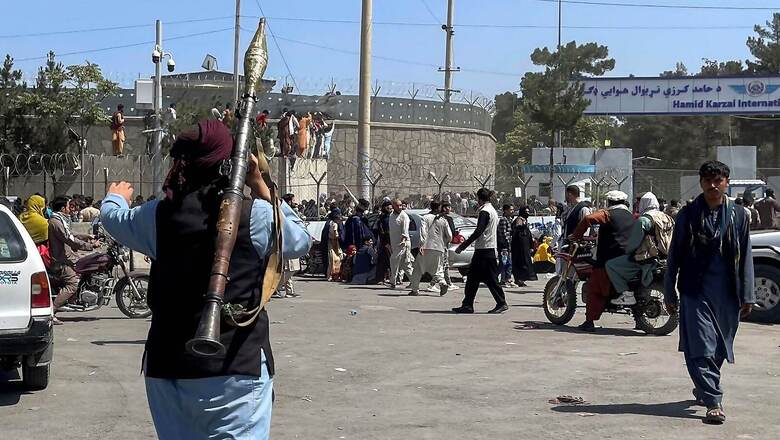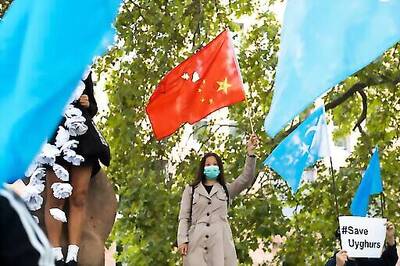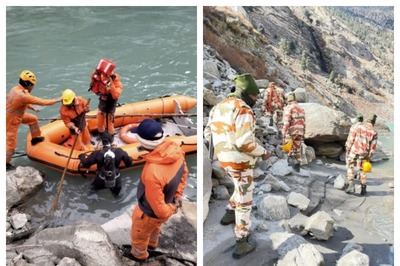
views
Even as images of Afghans crowding planes on the tarmac of Kabul airport and clinging onto the undercarriages of aircraft shocked the world on Monday and underlined the desperation of many to leave, several countries praised the Taliban for ensuring “peace and safety” in the country. As Taliban takes control of Afghanistan, here is how the insurgent group enjoys relations with the international powers:
China
The neighbouring country, which refused to recognise the rule of Taliban when it took over Afghanistan for the first time in 1996, was among the first ones to open doors for the extremists when they starting making territorial gains in the war-torn country amid the withdrawal of the US forces. China has already evacuated 210 of its nationals from Afghanistan by a chartered flight this week.
The Taliban has said it sees China as a “friend” of Afghanistan and assured Beijing that it would not host Uyghur Islamic militants from the volatile Xinjiang province, which is a major worry for the Chinese government.
China’s remarkable shift was on display little more towards the end of July, when its Foreign Minister Wang Yi welcomed a Taliban delegation to the northern port of Tianjin as the group made gains against the administration of President Ashraf Ghani, who fled the country on Sunday. Wang’s endorsement of the Taliban’s “important role” in governing Afghanistan provided a crucial boost of legitimacy for an organisation that has long been a global pariah due to its support of terrorism and the repression of women.
Beijing is concerned that under Taliban rule, Afghanistan will become a hub for the East Turkistan Islamic Movement (ETIM), a separatist outfit aligned to Al-Qaeda which is waging an insurgency in Xinjiang.
Russia
Russia’s ambassador to Afghanistan on Monday praised the Taliban’s conduct and said the group, still officially designated a terrorist organisation in Russia, had made Kabul safer in the first 24 hours than it had been under the previous authorities.
The comments by Ambassador Dmitry Zhirnov reflect an undisguised effort by Russia to deepen its well-established ties with the Taliban while stopping short, for now, of recognising the hardline Islamist group as the legitimate rulers of a country Moscow itself tried and failed to control before the Soviet Union withdrew its last forces in 1989.
The country fought a 10-year war in Afghanistan that ended with Soviet troops’ withdrawal in 1989. It has made a diplomatic comeback as a power broker in Afghanistan, mediating between feuding factions as it jockeys with Washington for influence in the country. In 2019, it hosted talks between various Afghan factions.
Taliban delegation met with senior Russian diplomats during two days of talks, insisted that the movement has honored its end of the deal signed last year on Qatar, where the Taliban maintain a political office. According to a report in Financial Times, President Putin is putting faith in a new relationship with the Taliban that he hopes will contain the threat from Isis and al-Qaeda.
Turkey
On Tuesday, Turkey said it welcomed the “positive messages” to the international community given by Taliban following their seizure of power in Afghanistan. “We welcome the positive messages given by the Taliban to foreigners, diplomatic missions and their own population. I hope we will see (the same approach) in their actions,” Turkish Foreign Minister Mevlut Cavusoglu said in televised comments.
It has dropped plans to take over Kabul airport after NATO’s withdrawal from Afghanistan but is ready to provide support if the Taliban request it, two Turkish sources said on Monday amid turmoil following the militant group’s victory in Afghanistan.
Turkey, which has 600 troops in Afghanistan, had offered to keep them in Kabul to guard and operate the airport after other NATO members pulled out, and was discussing details with Washington and the government of President Ashraf Ghani.
The move to scrap the plans comes after the rapid conquest of Afghanistan by Taliban insurgents following US President Joe Biden’s decision to withdraw US forces after 20 years of war that cost billions of dollars. Opposition parties in Turkey had criticised the government’s plans, saying such a mission would put Turkish soldiers at risk and calling for their immediate withdrawal amid the uptick in violence.
Uzbekistan
Afghanistan’s neighbour Uzbekistan on Tuesday said that it was in close contact with the Taliban and warned it would “strictly suppress” any attempts to violate its borders after the group effectively seized power. Ex-Soviet Uzbekistan, one of three Central Asian countries bordering Afghanistan, released the statement after days of mayhem that saw Afghan troops illegally cross over into the republic while fleeing the Taliban’s advance amid the pullout of US-led forces.
Uzbekistan’s foreign ministry said that it supported the pledge of “internal Afghan forces” for an inclusive government and said Tashkent was “looking forward to achieving a comprehensive peace in the framework of the inter-Afghan talks in Doha.” The ministry said it was in talks with the Taliban “on issues of ensuring the protection of borders and maintaining calm in the border zone”.
Both Uzbekistan and Tajikistan earlier this month hosted Russia-led military drills near their borders with Afghanistan.
Iran
Iran, which shares a 900-kilometre (560-mile) border with Afghanistan, and hosts nearly 3.5 million Afghans, has also offered its hand of friendship to the Taliban. Iran’s new ultraconservative President Ebrahim Raisi on Monday said that the “defeat” of the United States in Afghanistan must usher in a durable peace in the neighbouring, war-wracked country. “The military defeat and the US withdrawal from Afghanistan should offer an opportunity to restore life, security and lasting peace in that country,” Raisi said, quoted by his office.
The presidency statement came after the Taliban seized control of Kabul, but it did not mention the Taliban nor the fall of the Afghan capital. Raisi, who made the remarks in a call with outgoing Iran’s foreign minister Mohammad Javad Zarif, said the Islamic republic wanted good relations with Afghanistan.
In 1998, Taliban troops entered the Iranian consulate in the northern Afghan city of Mazar-i-Sharif, killing several diplomats and an official news agency journalist. The Taliban later said they had been killed by individuals acting independently, but Tehran held the movement responsible for the deaths, which sparked outrage and nearly triggered an Iranian military intervention in Afghanistan. Analysts say Tehran is taking a pragmatic stance on the Taliban’s resurgence in Afghanistan.
Read all the Latest News, Breaking News and Assembly Elections Live Updates here.




















Comments
0 comment